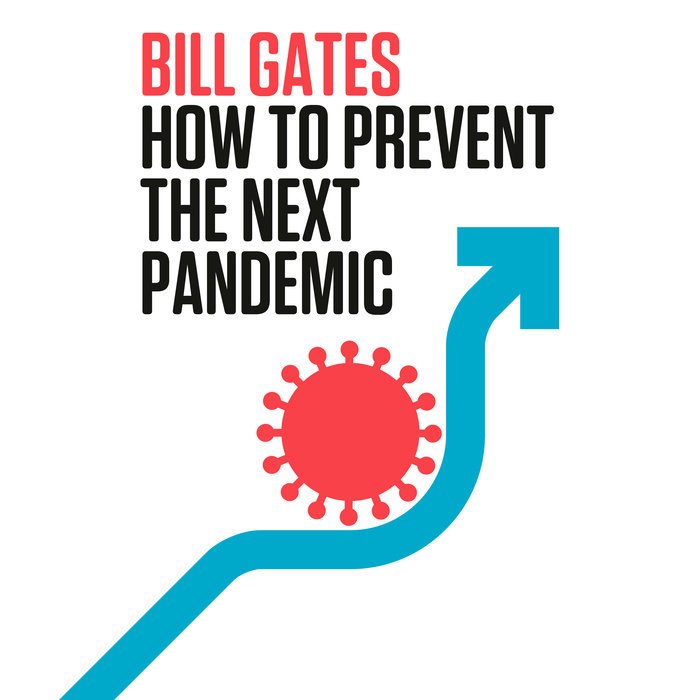How to Prevent the Next Pandemic Audiobook

Bill Gates How to Prevent the Next Pandemic
The COVID-19 pandemic is far from ended. However, as governments around the world struggle to get it under control, they are also beginning to discuss what will happen next. How can we avoid another pandemic that kills millions and devastates the global economy?
Can we ever hope to do this? Bill Gates feels the answer is yes, and he has created a mostly optimistic book in which he spells out clearly and convincingly what the world should learn from COVID-19, explains the science of battling pandemics, and offers what we can all do to help prevent another one.
#HowtoPreventtheNextPandemicAudiobook #HowtoPreventtheNextPandemic #BillGates
Bill Gates
Bill Gates co-founded the world’s largest software company, Microsoft, with Paul Allen, and went on to become one of the world’s richest men.
Bill Gates: Who Is He?
Bill Gates, an entrepreneur, and businessman, and his business partner Paul Allen founded and built Microsoft, the world’s largest software company, through technological innovation, astute business strategy, and aggressive business tactics. In the process, Gates became one of the world’s wealthiest men. Gates announced in February 2014 that he was stepping down as chairman of Microsoft to focus on charitable work at his foundation, the Bill and Melinda Gates Foundation.
On October 28, 1955, in Seattle, Washington, William Henry Gates III was born. Gates grew up with his older sister, Kristianne, and younger sister, Libby, in an upper-middle-class family. When their father, William H. Gates Sr., met his future wife, Mary Maxwell, he was promising, if somewhat shy, a law student. She was an athletic, outgoing University of Washington student who was heavily involved in student affairs and leadership.
The Gates family was close and warm, and all three children were encouraged to be competitive and strive for excellence. Gates demonstrated early signs of competitiveness by organizing family athletic games at their summer home on Puget Sound. He also enjoyed playing board games (his favorite was Risk) and was an expert at Monopoly.
Gates had a close relationship with his mother, Mary, who, after a brief career as a teacher, devoted her time to raising children, civic affairs, and charitable work. She also served on the boards of the First Interstate Bank of Seattle (founded by her grandfather), the United Way, and International Business Machines (IBM). She frequently brought Gates with her when she volunteered in schools and at community organizations.
DISCLAIMER: This website contains Amazon affiliate links, which means that if you click on one of the product links, we will receive a small commission.
It’s easy to say that people never learn from the past, but sometimes we do. Why hasn’t there been a world war? Three, partly because in 1945 world leaders looked at history and decided there were better ways to settle their differences. That’S the spirit in which I look at the lessons from covid. We can learn from it and decide to do a better job of protecting ourselves from deadly diseases.
In fact, it’s imperative to put a plan in place and fund it now before covid becomes yesterday’s news. The sense of urgency fades and the world’s attention moves on to something else about the word we use in various ways in this book. Sometimes I’m referring to work, I am personally involved in or the gates foundation is, but for the sake of simplicity, I also use we to refer to the global health sector more broadly or to the world at large. I will try to make my meaning clear in context. Many reports have documented the good and the bad of the world’s response to covet, and I’ve learned a lot from them.
I have also pulled together a number of key lessons from my work in global health, including projects such as polio eradication and from following the pandemic day to day with experts at the foundation and in governments, academia, and the private sector. A key element is to look at the countries that did better than others in doing the right things. Early pays huge dividends later. I know this sounds odd, but my favorite website is a treasure trove of data that tracks diseases and health problems all over the world. It’S called the global burden of disease, and the level of detail it contains is astonishing.
The 2019 version tracked 286 causes of death and 369 types of disease and injuries in 204 countries and territories. If you’re interested in how long people live, what makes them sick, and how these things can change over time, this site is the best source. There is a link to it in your pdf. I can spend hours at a time. Looking at the data, the site is published by the institute for health, metrics and evaluation ihme, which is located at the university of washington in my hometown of seattle, as you can probably guess, from its name ihme specializes in measuring health around the world.
It also does computer modeling that attempts to establish cause and effect relationships, which factors might explain why cases are going up or down in some country. And what does the forecast look like since early 2020, i’ve been peppering the team at ihme with questions about kovid? What i’ve hoped to find out is what the countries that are dealing most successfully with kovid have in common. What did they all do right once we answer that question with some certainty, we’ll understand the best practices and be able to encourage other countries to adopt them. The first thing you have to do is define success, but that’s not as easy as you might think.
You can’t just look at how often people with kovid in a given country went on to die from it. That statistic will be skewed by the fact that older people are more likely to die from covert than younger people, so countries with especially old populations will almost inevitably look worse. One country that did particularly well even though it has the world’s oldest population is japan. It had the best compliance with mass mandates of any country which helps explain some of its success, but other factors were probably also at play. What you really look for in a measure of success is a number that captures the overall impact of the disease.
People who die of heart attacks, because the hospital is too overwhelmed by covet patients to treat them ought to be counted just as much as people who die of the disease itself. There’S a measure that does exactly that. It’S called excess mortality and it includes people who die because of the disease’s ripple effect, as well as those who die directly from kovid. It’S the number of excess deaths per capita in order to account for the size of a country’s population, the lower your excess mortality, the better you’re doing, in fact, some countries – excess mortality – is actually negative. That’S because they had relatively few deaths from kovid, and there were also fewer traffic accidents and other fatal incidents, because people were staying home so much more toward the end of 2021.
America’S excess mortality was more than 3 200 per million people, roughly on par with brazil’s, and iran’s canada’s by contrast was around 650. While russia’s was well over seven thousand, you
More From This Category

The Fort Bragg Cartel Review
The Fort Bragg Cartel: An investigative reporter uncovers a web of drug trafficking, murder, and military cover-ups within the US Army's most elite units, sparked by the brutal killing of a Delta Force operator. Drugs, Murder, and the Special Forces' Alleged Cartel...

The Fort Bragg Cartel Review
The Fort Bragg Cartel: An investigative reporter uncovers a web of drug trafficking, murder, and military cover-ups within the US Army's most elite units, sparked by the brutal killing of a Delta Force operator. Drugs, Murder, and the Special Forces' Alleged Cartel...

The Fort Bragg Cartel Review
The Fort Bragg Cartel: An investigative reporter uncovers a web of drug trafficking, murder, and military cover-ups within the US Army's most elite units, sparked by the brutal killing of a Delta Force operator. Drugs, Murder, and the Special Forces' Alleged Cartel...




0 comentarios